

Mental Models: The Best Way to Make Intelligent Decisions (109 Models Explained) This guide explores everything you need to know about mental models. By the time you’re done, you’ll think better, make fewer mistakes, and get better results. On this page: The Great Mental Models Volumes One and Two are out.
Learn more about the project here. What Are Mental Models? Why can’t we read anymore? – Hugh McGuire. Spending time with friends, or family, I often feel a soul-deep throb coming from that perfectly engineered wafer of stainless steel and glass and rare earth metals in my pocket.

Touch me. Look at me. You might find something marvellous. Why Silence is the Think Tank of the Soul – Personal Growth. Upon meeting a Zen master at a social event, a psychiatrist decided to ask him a question that had been on his mind for a long time.

“Exactly how do you help people?” — the man inquired. “I get them where they can’t ask any more questions.” — the master replied. Mental noise is hurting our minds — we are continually asking questions that create busyness, not knowledge. We are in ‘reacting mode,’ leaving no room for reflection. Mental Models: Learn How to Think Better and Gain a Mental Edge. Definition: What Are Mental Models?

Let's start with a definition. What are mental models? A mental model is an explanation of how something works. Mental Models I Find Repeatedly Useful. Fermi Questions by @TeacherToolkit. First Principles: The Building Blocks of True Knowledge. This Is Exactly How You Should Train Yourself To Be Smarter [Infographic] View the high resolution version of the infographic by clicking here.
![This Is Exactly How You Should Train Yourself To Be Smarter [Infographic]](http://cdn.pearltrees.com/s/pic/th/exactly-yourself-infographic-167363350)
Out of all the interventions we can do to make smarter decisions in our life and career, mastering the most useful and universal mental models is arguably the most important. Over the last few months, I’ve written about how many of the most successful self-made billionaire entrepreneurs like Ray Dalio, Elon Musk, and Charlie Munger swear by mental models. I’ve collected the 650+ most useful mental models from the best mental model curators in the world. And I’ve launched a free mental model mini-course to help you understand what a mental model is and how to apply it to your life. Mental Models: How to Train Your Brain to Think in New Ways. You can train your brain to think better.
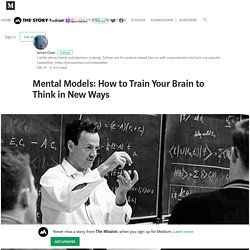
One of the best ways to do this is to expand the set of mental models you use to think. Let me explain what I mean by sharing a story about a world-class thinker. I first discovered what a mental model was and how useful the right one could be while I was reading a story about Richard Feynman, the famous physicist. Feynman received his undergraduate degree from MIT and his Ph.D. from Princeton. During that time, he developed a reputation for waltzing into the math department and solving problems that the brilliant Ph.D. students couldn’t solve. Want To Rewire Your Brain For Meaningful Life Changes? Do These Things Immediately.
You are the architect of your brain.
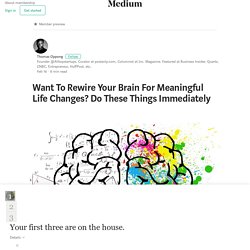
It turns out you can teach an old dog new tricks. Until recently, the conventional thinking was that our brains were hardwired at birth and therefore unchangeable. But the good news is that our brains are constantly being reshaped by our daily experiences. You can control improve how you think, act and behave if you choose your actions and experiences with care.
Enter Neuroplasticity. What Does It Mean to Think Well? – Member Feature Stories. The 5 Elements of Effective Thinking. The Crucial Thinking Skill Nobody Ever Taught You – The Mission. How Great Thinkers Shatter the Status Quo The German mathematician Carl Jacobi made a number of important contributions to different scientific fields during his career.
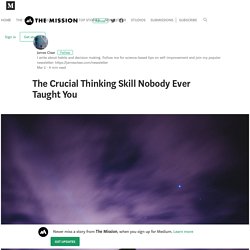
In particular, he was known for his ability to solve hard problems by following a strategy of man muss immer umkehren or, loosely translated, “invert, always invert.” Jacobi believed that one of the best ways to clarify your thinking was to restate math problems in inverse form. He would write down the opposite of the problem he was trying to solve and found that the solution often came to him more easily. 20 cognitive biases that screw up your decisions. People Have Limited Knowledge. What’s the Remedy? Nobody Knows. THE KNOWLEDGE ILLUSION Why We Never Think Alone By Steven Sloman and Philip Fernbach Illustrated. 296 pp.

Riverhead Books. $28. In “The Knowledge Illusion,” the cognitive scientists Steven Sloman and Philip Fernbach hammer another nail into the coffin of the rational individual. From the 17th century to the 20th century, Western thought depicted individual human beings as independent rational agents, and consequently made these mythical creatures the basis of modern society. Democracy is founded on the idea that the voter knows best, free market capitalism believes the customer is always right, and modern education tries to teach students to think for themselves. The Work Required to Have an Opinion. The Power of Questions and the Problem with Answers. If you are living cross-culturally lean in a little bit here.
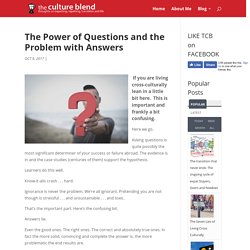
This is important and frankly a bit confusing. Here we go. Asking questions is quite possibly the most significant determiner of your success or failure abroad. The evidence is in and the case studies (centuries of them) support the hypothesis. Learners do this well. The Fundamental Importance Of Emotions In Decision Making. The fundamental importance of emotions in every decision-making process has been widely understated and misrepresented.
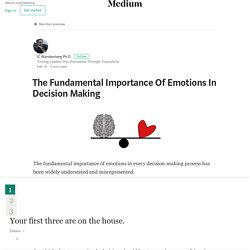
We all know fairly well how emotions (both positive and negative) will lead to poor decisions. But what most people don’t seem to know is that, if we eliminate emotions from most decision-making processes, we would not be able to go too far.